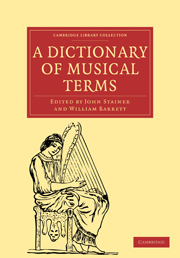W
Published online by Cambridge University Press: 10 November 2010
Summary
Waits, or Wayghtes. Originally certain minstrels or musical watchmen attached to the households of kings and other great persons, who paraded an assigned district sounding the hours at night. Until very recently, the Waits of the City of Westminster were regularly sworn before the “Court of Burgesses.” In the, ”Liber niger domus regis” quoted in Rymer's “Fœdera,” in an account of the musicians of the household of Edward IV., mention is made of “A Wayte, that nightely from Mychelmas, to Shreve Thorsdaye, pipe the watche within this courte fowere tymes; in the somer nightes iij tymes, and makyth Bon Gayte at every chamber, doare, and offyce, as well for feare of pyckeres and pillers.” Many cities and towns, both English and foreign, encouraged and licensed their “waits,” Exeter among other places having a regular company as early as the year 1400.
In the “Coxcomb,” by Beaumont and Fletcher, we find this allusion to a neglect of duty on the part of the watchmen.
“Where were the Watch the while? Good sober gentlemen
They were like careful members of the City,
Drawing in diligent ale and singing Catches.”
The word was sometimes used to describe those who acted as the town musicians but who did not do duty as watchmen. It was also given to any company of performers when employed as serenaders.
- Type
- Chapter
- Information
- A Dictionary of Musical Terms , pp. 453 - 454Publisher: Cambridge University PressPrint publication year: 2009First published in: 1876



